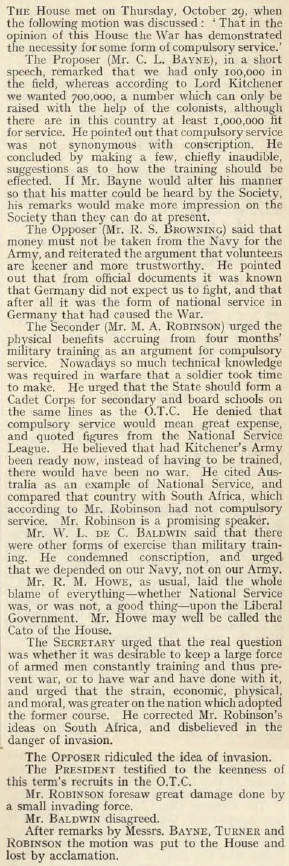The present situation renders Conscription imperative, continued
Mr. BRANDON-THOMAS referred people who said conscription would not work to the example of France. The idea that one volunteer is worth three conscripts seemed to rankle in his mind, and he eulogised the German soldier’s fighting qualities. After a brief tirade against strikers, he resumed his seat.
The PRESIDENT deplored the lack of definition hitherto painfully evident in the speeches of the House. He considered that conscription should refer to all branches of work such as munition making, not only to active service. He fiercely resented Mr. Brandon-Thomas’s desire to win the war by hook or crook ; but conscription was not slavery, it was elementary justice. Of course we wanted more men, and there were plenty to get. If the people refused to have conscription, they must go under and Democracy be proved a failure.
The VICE-PRESIDENT wanted to know how we were to discriminate between who should go and who not. He made the extraordinary remark that our Government was as autocratic as that of Germany, citing the Prime Minister as an example.
Mr. JACKSON considered we could avoid the difficulty by letting our colonies have conscription and fight for us.
Mr. ABRAHAMS pointed out the impertinence of this suggestion. He denied that we should not be able to free ourselves from conscription after the war.
Mr. HARROD made a fierce attack on the ethics of conscription. It was Great Britain’s sacred duty to uphold the cause of freewill. She had forgotten it in America, in India. Let her not forget it again. The failure of the voluntary system would entail a defeat greater than any Germany could inflict upon us.
Mr. BRANDON-THOMAS denied this, and asked if the House considered France a country of slaves with no regard for freewill. With reference to Mr. Jackson’s remark, he waxed eloquent over the ‘ Yellow Peril.’
The Debate then resolved itself into a series of isolated quarrels, the fiercest being that between the President and Mr. Harrod on the rights of the individual.
After a final summing up by the VICE-PRESIDENT the motion was put to the House, and carried by 12 votes to nine.
